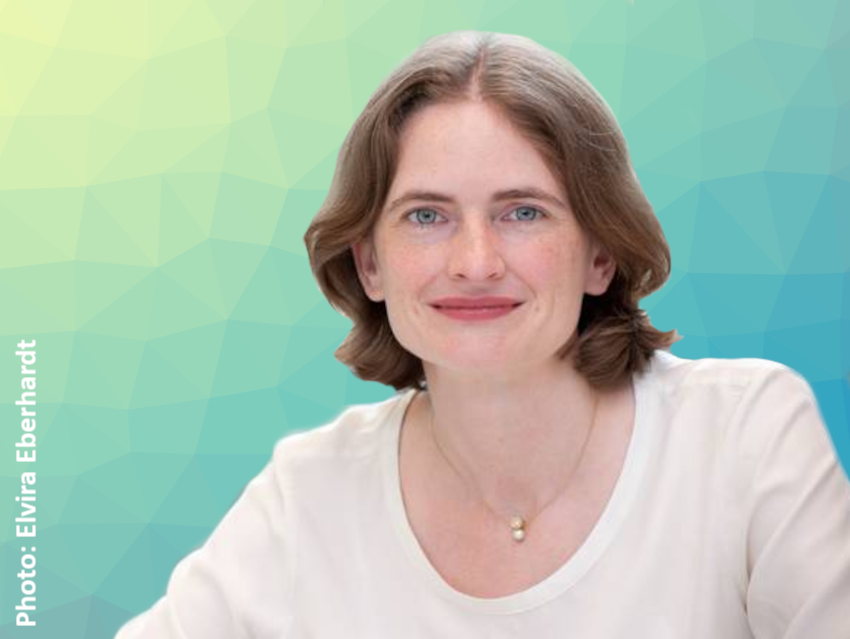Tanja Weil, Max Planck Institute for Polymer Research, Mainz, Germany, has received the Karl Ziegler Prize 2023 from the Gesellschaft Deutscher Chemiker (GDCh, German Chemical Society) and the Karl Ziegler Foundation. The award is one of the most highly endowed German awards in the field of chemistry, with EUR 50,000 and a gold medal. It was presented at a public symposium in honor of Karl Ziegler in Frankfurt am Main, Germany, on April 25, 2023.
Tanja Weil receives the award for her outstanding and innovative work in which she combines polymer synthesis and supramolecular structure formation to answer current biomedical questions. With her research, she is opening up new avenues for materials in biomedicine that can actively bring about regeneration processes.
Research
Tanja Weil’s research focuses on the development of innovative synthesis concepts for the production of functional macromolecules and hybrid materials to solve challenges in biomedicine and materials science. She aims to synthesize macromolecular architectures with a high degree of structural precision that feature multifunctionalization, have adaptive features that react to their respective nano- or micro-environments, and bridge length scales from the nanoscale to the macroscopic range.
It is Weil’s vision to develop polymeric materials that interact with their environment in a controlled and adaptive manner. Such materials could perform challenging tasks such as the targeted transport of active substances or contrast agents, directed interactions with cells and cell assemblies, and the modulation of cell processes.
Career
Tanja Weil studied chemistry at the Technical University of Braunschweig, Germany, and the University of Bordeaux I, France, and completed her Ph.D. at the Max Planck Institute for Polymer Research, under the supervision of Klaus Müllen in 2002. From 2002 to 2006, she served as Section Head for Medical Chemistry at Merz Pharmaceutical GmbH, Frankfurt am Main, Germany, followed by posts there as Department Head for Medical Chemistry and Drug Design in 2007 and as Director for Chemical R&D in 2008. From 2008 to 2010, Weil was an Associate Professor at the National University of Singapore (NUS), and from 2010 to 2016, she served as Professor and Director of the Institute of Organic Chemistry III at Ulm University, Germany. Since 2017, Tanja Weil has served as Director at the Max Planck Institute for Polymer Research, where she heads the division “Synthesis of Macromolecules”.
Among other honors, Tanja Weil has received the Otto Hahn Medal from the Max Planck Society, Germany, in 2002, a Synergy Grant from the European Research Council (ERC) in 2012, the Netherlands Scholar Award for Supramolecular Chemistry in 2020, and Honorary Professorships from Ulm University and the University of Mainz. In addition to other commitments, she serves as an Advisory Board Member for Biotechnology of the German state of Rhineland-Palatinate, a Fellow of the Executive Board of the Max Planck School Matter to Life, as a Board Member of the Mildred Scheel Foundation for German Cancer Research, and as a Senate Member of the German Research Foundation (Deutsche Forschungsgemeinschaft, DFG).
Selected Publications
- Aptamers as Novel Binding Molecules on an Antimicrobial Peptide-Armored Composite Hydrogel Wound Dressing for Specific Removal and Efficient Eradication of Pseudomonas aeruginosa,
Markus Kraemer, Magali Bellion, Ann-Kathrin Kissmann, Tilmann Herberger, Christopher V. Synatschke, Anil Bozdogan, Jakob Andersson, Armando Rodriguez, Ludger Ständker, Sebastien Wiese, Steffen Stenger, Barbara Spellerberg, Kay-Eberhard Gottschalk, Ahmet Cetinkaya, Joanna Pietrasik, Tanja Weil, Frank Rosenau,
Int. J. Mol. Sci. 2023, 24, 4800.
https://doi.org/10.3390/ijms24054800 - Introducing carbohydrate patterning in mannose-decorated supramolecular assemblies and hydrogels,
Laura Rijns, Lu Su, Konrad Maxeiner, Giulia Morgese, David Y. W. Ng, Tanja Weil, Patricia Y. W. Dankers,
Chem. Commun. 2023, 59, 2090–2093.
https://doi.org/10.1039/d2cc06064g - Sulfur‐Composites Derived from Poly(acrylonitrile) and Poly(vinylacetylene) – A Comparative Study on the Role of Pyridinic and Thioamidic Nitrogen,
Julian Kappler, Sina V. Klostermann, Pia L. Lange, Michael Dyballa, Lothar Veith, Thomas Schleid, Tanja Weil, Johannes Kästner, Michael R. Buchmeiser,
Batteries Supercaps 2023.
https://doi.org/10.1002/batt.202200522 - Mitochondria Targeted Protein-Ruthenium Photosensitizer for Efficient Photodynamic Applications,
Sabyasachi Chakrabortty, Bikram Keshari Agrawalla, Anne Stumper, Naidu M Vegi, Stephan Fischer, Christian Reichardt, Michael Kögler, Benjamin Dietzek, Michaela Feuring-Buske, Christian Buske, Sven Rau, Tanja Weil,
J. Am. Chem. Soc. 2017, 139, 2512–2519.
https://doi.org/10.1021/jacs.6b13399 - Diverse Applications of Nanomedicine,
Tanja Weil, Wolfgang J. Parak, et al.,
ACS Nano 2017, 11, 2313–2381.
https://doi.org/10.1021/acsnano.6b06040 - The Rylene Colorant Family-Tailored Nanoemitters for Photonics Research and Applications,
Tanja Weil, Tom Vosch, Johan Hofkens, Kalina Peneva, Klaus Müllen,
Angew. Chem. Int. Ed. 2010, 49, 9068–9093.
https://doi.org/10.1002/anie.200902532



